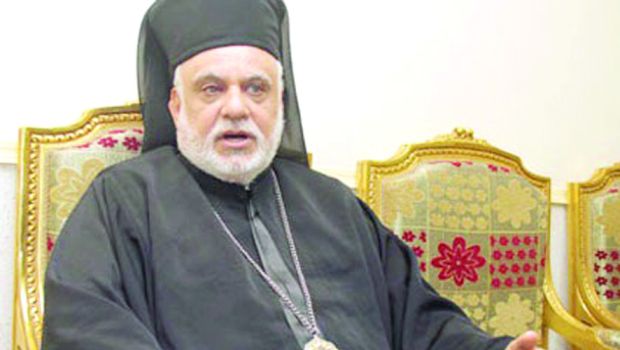
Bishop Antonius Aziz, representative of Egypt’s Catholic Church in the 50-Member Constitutional Committee speaking to Asharq Al-Awsat. (Asharq Al-Awsat)
Cairo, Asharq Al-Awsat—The Catholic Church’s representative to Egypt’s 50-member constitution drafting committee, Bishop Antonius Aziz, denied that there was any dispute with Al-Azhar over constitutional articles on Egypt’s national identity or the top Sunni Muslim body’s future role in the country.
“The three churches [Orthodox, Catholic, and Evangelical] have agreed with Al-Azhar on all the articles relating to it,” Bishop Aziz told Asharq Al-Awsat.
He added: “There is no disagreement with Al-Azhar’s vision of the articles that relate to it…or over Article 4. Al-Azhar knows its affairs best.”
Article 4 relates to the formation of political parties, banning any parties formed on religious grounds.
Bishop Aziz affirmed that the new constitution should include an article banning the establishment of religious parties that utilize “religion as a pretext for political issues or for other purposes.”
“Everyone now completely understands that what happened happened because of the establishment of religious parties,” he said in reference to the former Muslim Brotherhood rule.
“In addition to religious parties, the ban should include private societies and institutions established on religious grounds,” the Bishop added.
Article 6 of the suspended constitution says that “no political party shall be formed that discriminates on the basis of gender, origin or religion.”
Article 219 has also been a major source of controversy in the Egyptian constitutional drafting process. The article stipulates that “The principles of Islamic Shari’a include its commonly accepted interpretations, its fundamental and jurisprudential rules, and its widely considered sources, as stated by the schools of Sunna and Gamaa.”
In previous comments to Asharq Al-Awsat, Bishop Antonius Aziz said: “Everyone agreed to reject Article 219 because it does not express Islam and was added [to the constitution] in a suspicious way. It infringes on the rights of Muslims more than Christians.”
“Muslims have the right to demand the implementation of Shari’a law but they must not ignore their Christian brothers…or treat them unequally,” he added.
Article 3 of the suspended constitution stipulates that “The canon principles of the People of the Book [an Islamic term referring to Abrahamic religions] are the main source of legislation for their personal status laws, religious affairs, and the selection of their spiritual leaders.”
Aziz confirmed that an agreement has been reached to change this term from the People of the Book, which is viewed as an offensive term by some, to “Muslims, Christians, and Jews.”
Four senior Christians represent Egypt’s three main Churches in the 50-member constitution drafting committee tasked with amending the former Islamist-backed constitution. That document, introduced in 2012, was suspended following the ouster of President Mohamed Mursi in early July.
Bishop Aziz dismissed Islamist claims that the 50-member body is partisan, affirming that it represents the complete spectrum of Egyptian society. He added that this is an independent body that is operating free of any external pressures.
